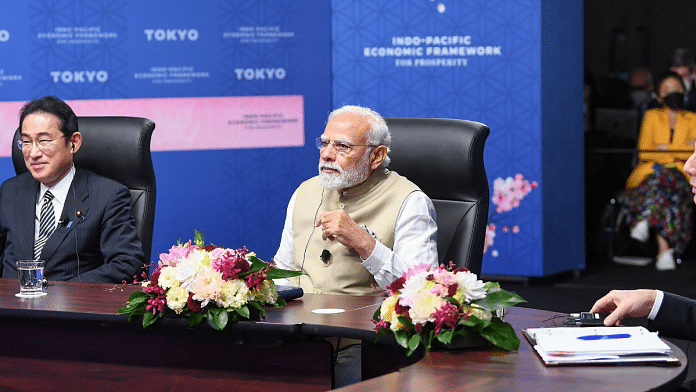The launch of the Indo-Pacific Economic Framework for Prosperity in Tokyo, Japan, is yet another step that recognises the salience of the emerging region. With this, the Indo-Pacific region truly becomes an important factor in the new realignment of the emerging world order.
Keeping in view the centrality of India in the Indo-Pacific trade and security architecture, New Delhi should have ideally worked on the idea and initiated the process much before US President Joe Biden announced it. The stakes are very high for India in the entire scheme of things, especially in the context of India’s neighbours going belly up in the wake of economic woes engineered by the Chinese debt trap.
The Covid-19 pandemic greatly intervened in the economic development of the emerging economies of the world mainly fuelled by four strong growth engines, the US, China, India, and Japan, three of them in the Eastern hemisphere, thus strategically changing the geopolitical dynamics.
Nearly a decade after the global economic meltdown triggered by the fault lines in the US banking system, the global economy was trying to make up for the setback. The strong tailwinds that were promising to accelerate growth changed course only to dampen the spirits.
The pandemic hurt the global economy and brought markets to a standstill. Supply Chain mechanisms went haywire, necessitating new thinking and systems which would be rooted in a strong cooperative framework rather than single economy hegemony, liberal or centralised.
Also read: With Russia-China bombers, Quad has to be all for one and one for all. Nothing less will do
What brought IPR together
Indo-Pacific was the ideal platform that represents nearly 60 per cent of the global GDP with the potential to include the maximum number of countries next only to the United Nations (UN). Besides, unlike the UN, Indo-Pacific does not have any structural reservation about emerging as an economic platform besides including other agenda, both contemporary and futuristic.
As a region of ‘confluence of two oceans’, IPR countries also had another urgent and compelling reason to put their heads together to work out a trade forum.
The transition of some of the national and regional economies to the Belt and Road Initiative (BRI) basket spearheaded by Beijing sought to initiate a strategic shift in the global governance and trade structures. China’s BRI, considered the signature project of Xi Jinping, was altering the very fundamentals of trade, commerce and industry. Countries that affirmed to be part of the BRI slowly and steadily, but not necessarily willingly, began to integrate their respective economies with that of China. That they were blindly walking into a ‘debt trap’ was evident but the rules of the game were set by China unilaterally.
Beijing also jettisoned the outdated and ruinous doctrine of Marxist economy and embraced the global market with capitalist policies in Chinese characteristics. This gave two distinct advantages to China besides others. One was that the BRI projects were an exclusive preserve of a bilateral trade agreement in an increasingly multi-polar world.
While Beijing was part of the global economic and trade structures, it was not obliged to share its spoils with the global lending institutions from which it could draw huge funds to finance the BRI projects. Unlike the Marshall Plan, where aid was provided without repayment terms, BRI funds are debts that require the countries to seek an International Monetary Fund (IMF) bailout. Another advantage for China is the vast asset base that it inherits from the defaulting countries. Thus, China is able to tap enormous international funds and also own assets of defaulters.
Also read: ‘Force for good’ — Quad sends message of solidarity amid Russia invasion, China challenges
A missed opportunity for India
The Quad has been mulling over floating a trade forum that will provide an alternative to the highly one-sided BRI projects. Earlier, the European Union announced an ambitious Global Gateway programme to compete with the BRI but it seems to have lost its steam. Building upon the pre-poll campaign promise of ‘Build Back Better’, the US and other G7 countries announced a “values-driven” economic partnership programme for developing economies, namely the “Build Back Better World” platform. That again seems to have run out of ideas and probably funds too.
India was not part of this platform as it was a ‘Western’ initiative. The US and Taiwan signed an agreement “to raise funds through bonds aimed at Taiwanese banks, insurers and other private capital” to fund projects in Asia to checkmate the BRI. Not only has nothing been heard of this plan but the recent Indo-Pacific Economic Forum (IPEF) too is silent on the participation of the highly developed and vibrant Taiwanese economy.
The primary objective of IPEF seems to be to help the US business houses, people, and farmers (ranchers) to tide over inflation and tap into the Indo-Pacific economic opportunities. Luckily, the White House statement does not conceal the motives of the US, an “Indo-Pacific economic power”.
India has welcomed the IPEF and Prime Minister Narendra Modi thanked US President Biden for the “important initiative”. New Delhi has also endorsed the idea of keeping the IPEF ‘open’ for other countries to join. While such concurrence is necessary and timely, it remains to be seen how effective this forum would be in catering to the needs of the stakeholders in the Indo-Pacific region.
It was in India’s interest to spearhead the movement for an economic forum that includes all the countries of the Indo-Pacific, under the collective leadership of the Quad. We have lost the first mover advantage but we should derive maximum benefit out of the IPEF by being a rule maker, and not merely a follower of the rules.
The author is the former editor of ‘Organiser’. He tweets @seshadrichari. Views are personal.
(Edited by Prashant)



